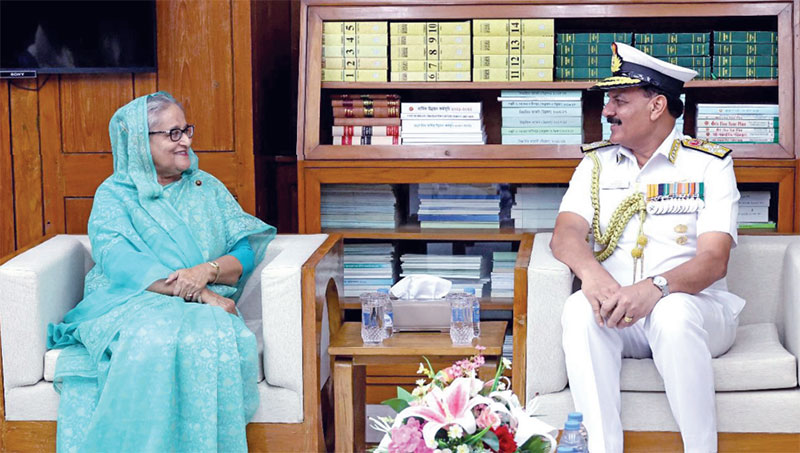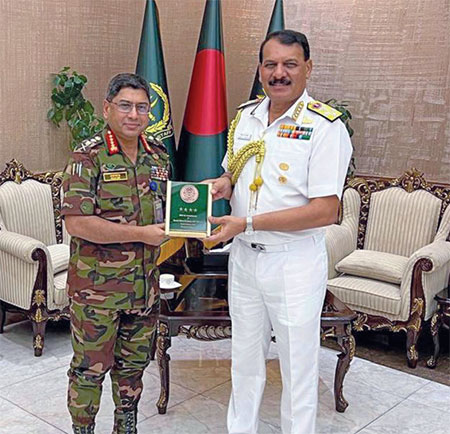Border defence forces of India, Bangladesh meet under the shadow of back-to-back incidents
Subhashis Mittra
The Border Coordination Conference between the Border Security Force (BSF) and the Border Guard Bangladesh (BGB)—an annual feature—this time too discussed various issues related to international boundary management. But this time the meeting took place under the shadow of at least half a dozen incidents of exchange of fire between BSF personnel and Bangladeshi cattle smugglers armed with illegal weapons barely days before the meeting.

Just ahead of the commander-level meeting in July, there were three back-to-back incidents reported at the India-Bangladesh border in West Bengal. In two incidents, cattle smugglers armed with sharp-edged weapons tried to snatch the weapons of BSF personnel but were foiled. The BSF recovered cattle and swords from the smugglers.
The smugglers and other criminals have been taking advantage of the BSF’s non-lethal weapons policy in dealing with intruders at the Bangladesh border. On June 9, a cattle smuggler was shot dead when a group at the Kalamchera border outpost in Tripura tried to snatch weapons from a BSF constable after entering 150 metres inside Indian territory. At the same place on June 2, smugglers had assaulted a BSF jawan and fled with his weapon.
In another incident, Bangladesh smugglers armed with spears and swords entered the Indian side and tried to attack the BSF jawans near Malda in north Bengal. When they did not retreat even after BSF threw stun grenades, the force resorted to firing after which the smugglers returned to Bangladesh.
The high-level meeting decided to share real-time intelligence, increase joint patrolling and identify sensitive and vulnerable areas to check smuggling and address security challenges along the India-Bangladesh border.
After the conclusion of the meeting, BSF Inspector General (South Bengal Frontier) Ayush Mani Tiwari said the dialogue has provided an important opportunity to enhance security and cooperation along the border. “We are confident that this dialogue will result in curbing border crimes and strengthen the security of both the countries,” he said, noting that both the countries understood the need to strengthen the security at the border so that illegal activities can be stopped and the people of both nations can feel safe.
According to a BSF statement, the Indian side expressed ‘deep concern’ over the increasing attacks by Bangladeshi miscreants and smugglers on BSF jawans and Indian citizens. Both sides decided to work together and carry out joint patrolling to identify vulnerable areas and prevent crimes.
After the Kolkata meeting, a four-day inspectors general meeting was held in Shillong, where the BSF and BGB officials resolved on a collaborative effort to address trans-border issues, including illegal smuggling along the Indo-Bangladesh border. Both sides agreed to maintain peace and tranquillity along the international border, emphasising a joint fight against insurgent activities and various trans-border crimes.
The meeting culminated in the signing of the Joint Record of Discussion (JRD) after both sides ‘reached a consensus on several key measures’ to effectively deal with crimes along the border. The 11-member Bangladeshi team was led by Brigadier General Shamim Ahmed, Additional Director General, Region Commander, South Western Region, Jessore, while the 14-member Indian delegation of BSF and Union home ministry officials was headed by Tiwari.
Between 1 January 2024, and 31 May 2024, miscreants from Bangladesh, mainly smugglers, have been involved in at least 969 attacks on border guards. The number of such attacks in 2023 was 2,145. Most attacks were reported at the southern Bengal frontier, followed by Tripura.
Despite the string of attacks, no concrete action has been taken at the border. The cross-border smugglers feel emboldened and even dare to snatch weapons from jawans. In one case, the smugglers hacked a BSF jawan, leaving him critically wounded. Criminals along the India-Bangladesh border smuggle items ranging from gold, cough syrup, birds, tortoises and cattle. The value of the goods is estimated to run into crores of rupees.
In this conference too, various issues of mutual interest for effective border management including joint efforts against cross-border crime, pending development works of the border area, and measures to prevent illegal cross-border movement were discussed between the two forces. Heads of both delegations deliberated and re-emphasised jointly evolving viable solutions to various bilateral issues being confronted by both forces, to create an environment of peace and tranquillity along the international boundary by amicably resolving them and further strengthening the bond of friendship, mutual trust and cooperation.

After Tripura chief minister Manik Saha recently highlighted the spike in infiltration along the international border in the northeastern state, the BSF cracked the whip on smugglers and touts enabling human trafficking. The force has beefed up security at sensitive outposts even as a dossier containing a list of Bangladeshi criminals operating in the border areas was handed over to the force of the neighbouring country.
“The BGB has assured us that action would be taken against them as per the law,” according to BSF Tripura Frontier Inspector General (IG) Patel Piyush Purushottam Das, who also said that both the border guarding forces have agreed to identify vulnerable stretches and conduct specially coordinated joint patrols.
Officers concerned have been asked to launch intelligence-based operations to nab the smugglers and touts, while additional teams are being deployed and special focus is being given to joint operations with state police. In addition, physical domination has been augmented with surveillance technology which includes AI-enabled cameras and facial recognition tools.
The annual Border Coordination Conference between the two forces is a key meeting to resolve boundary disputes and enhance border management effectiveness. Such conferences contribute significantly to promoting a safer and more secure border environment, ensuring stability and prosperity in the region, a BSF spokesperson said.
An official communique from BSF Meghalaya Frontier said that various issues of bilateral interest which will pave the way towards enhancing the understanding and cooperation between both the border forces were discussed at length over the three days after the first round of talks in Kolkata.
Further, special emphasis was given to focus issues, particularly insurgent activities, various trans-border crimes including smuggling of contraband items like psychotropic drugs and narcotic substances, border violation and pending infrastructural/developmental works, besides the common Coordinated Border Management Plan (CBMP), the statement noted.
The BSF delegation highlighted the ‘sincere commitment’ of both the border guarding forces in maintaining peace and harmony along the international boundary and strengthening the existing robust cordial relations.
Over the past few years, the BSF and the BGB have not only cemented their bond of friendship, developing new dimensions of mutual trust and cooperation, but have also acquired new dimensions for resolving bilateral border issues through meaningful dialogues at various command levels. The last Border Coordination Conference was held at Chattogram, Bangladesh, in September 2023.

